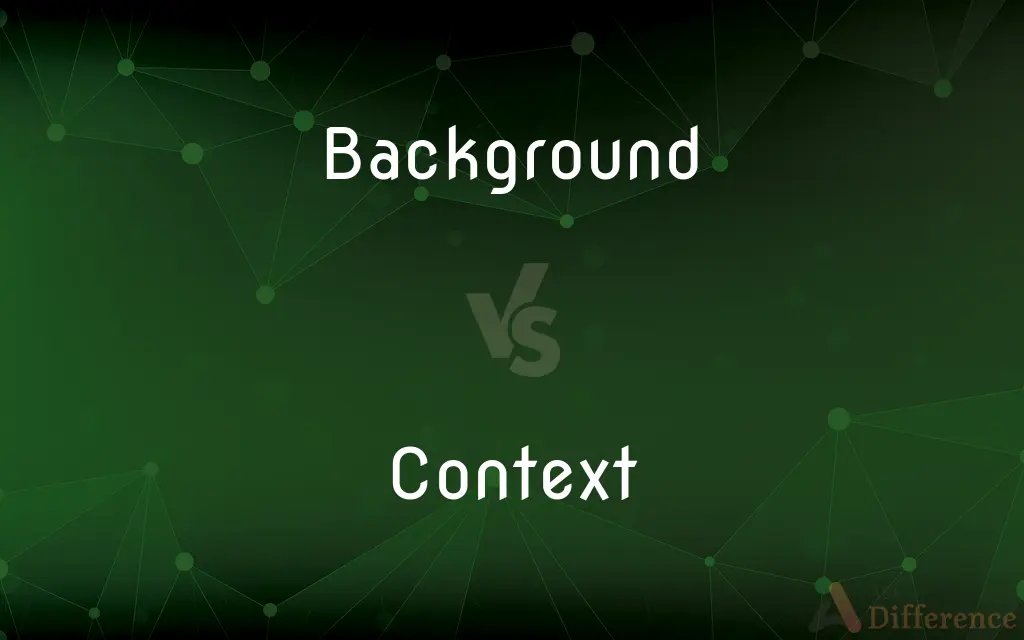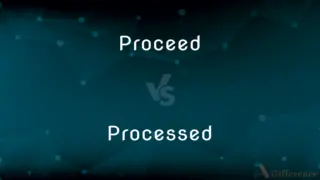Background vs. Context — What's the Difference?
By Urooj Arif & Maham Liaqat — Updated on March 25, 2024
Background refers to information or circumstances that precede and influence an event or situation, while context involves the conditions that surround an event, enriching its understanding.

Difference Between Background and Context
Table of Contents
ADVERTISEMENT
Key Differences
Background and context, though closely related and often used interchangeably, serve different purposes in understanding information or situations. Background provides the necessary historical, cultural, or situational specifics that precede an event or topic, offering insight into its origins and development. Context, on the other hand, refers to the set of circumstances or facts that surround an event or situation, providing clarity and meaning. It frames the situation within a larger picture, highlighting how external factors influence perception and understanding.
For example, in analyzing a historical event, the background might include the political climate, economic conditions, and key figures leading up to the event. The context, however, would encompass the broader societal, cultural, and international circumstances that shape and are shaped by the event, including contemporaneous public opinion and subsequent reactions. While background tends to be more static, offering a snapshot of what has led to a situation, context is dynamic, constantly evolving as new information emerges and situations develop.
In literature, background might refer to an author’s life, the historical period in which a work was written, or its publication history. Context could involve the literary movement the work is part of, its reception by contemporaries, and its thematic relation to other works. Background sets the stage, providing depth to the narrative or analysis, while context connects the dots, enhancing comprehension through the examination of relationships and impacts.
Understanding the distinction between background and context is crucial in various fields such as journalism, history, and literature, as it aids in developing a more nuanced interpretation of information. Background equips the audience with the necessary information to understand the basis of an issue, while context widens the lens, offering a comprehensive view that considers multiple angles and the interplay of various elements.
Despite their differences, both background and context are integral to a full understanding of any subject. They complement each other, with background laying the groundwork for deep dives, and context weaving connections that illuminate the broader implications and meanings of events, behaviors, or texts.
ADVERTISEMENT
Comparison Chart
Definition
Historical, cultural, or situational specifics preceding an event
Circumstances that surround and influence an event
Purpose
Provides insight into origins and development
Offers clarity and meaning by framing the situation
Nature
More static, focused on past influences
Dynamic, evolves with new information and situations
Example Use
Political climate leading up to an event
Societal and cultural factors influencing perceptions
Fields
Journalism, history, literature
Journalism, sociology, cultural studies
Compare with Definitions
Background
Historical or situational specifics preceding something.
The background of the civil rights movement includes decades of inequality.
Context
Conditions surrounding an event or situation.
The remark must be viewed in the context of the ongoing debate.
Background
Information necessary for understanding a topic's foundation.
Her background in biology helped her grasp the research quickly.
Context
Framework that influences understanding.
The study's findings change when taken in the context of recent discoveries.
Background
Preceding events leading to a current situation.
Understanding the conflict requires knowledge of its historical background.
Context
Dynamic circumstances that evolve.
The policy's significance is understood within the context of current events.
Background
Cultural or educational history of a person.
His diverse background contributes to his unique perspective.
Context
The interrelated conditions that add meaning.
The context of global warming includes economic, environmental, and social factors.
Background
The setting or circumstances from the past influencing the present.
The novel’s background is set in 19th-century France.
Context
The broader situation affecting perceptions.
Art movements can only be fully appreciated in their historical context.
Background
The part of a picture, scene, or design that forms a setting for the main figures or objects, or appears furthest from the viewer
The word is written in white on a red background
The house stands against a background of sheltering trees
Context
The part of a text or statement that surrounds a particular word or passage and determines its meaning.
Background
The circumstances or situation prevailing at a particular time or underlying a particular event
The political and economic background
Background information
Context
The circumstances in which an event occurs; a setting.
Background
Form a background to
Windswept land backgrounded by the Rockies
Context
The surroundings, circumstances, environment, background or settings that determine, specify, or clarify the meaning of an event or other occurrence.
In what context did your attack on him happen? - We had a pretty tense relationship at the time, and when he insulted me I snapped.
Background
Provide with background
The embassy backgrounded American reporters
Context
(linguistics) The text in which a word or passage appears and which helps ascertain its meaning.
Without any context, I can't tell you if the "dish" refers to the food, or the thing you eat it on.
Background
The ground or scenery located behind something.
Context
(archaeology) The surroundings and environment in which an artifact is found and which may provide important clues about the artifact's function and/or cultural meaning.
Background
The part of a pictorial representation that appears to be in the distance and that provides relief for the principal objects in the foreground.
Context
(mycology) The trama or flesh of a mushroom.
Background
The general scene or surface against which designs, patterns, or figures are represented or viewed.
Context
(logic) For a formula: a finite set of variables, which set contains all the free variables in the given formula.
Background
A position, area, or situation that is not immediately in one's attention or notice
You can hear traffic moving in the background during the interview.
Context
(obsolete) To knit or bind together; to unite closely.
Background
(Computers) The environment in which programs operate that the user does not engage with directly
Processes that run in the background.
Context
(obsolete) Knit or woven together; close; firm.
Background
The circumstances and events surrounding or leading up to an event or occurrence.
Context
Knit or woven together; close; firm.
The coats, without, are context and callous.
Background
A person's experience, training, and education
Her background in the arts is impressive.
Context
The part or parts of something written or printed, as of Scripture, which precede or follow a text or quoted sentence, or are so intimately associated with it as to throw light upon its meaning.
According to all the light that the contexts afford.
Background
The cultural or social environment in which a person was brought up or has lived
A class with students from many different backgrounds.
Context
To knit or bind together; to unite closely.
The whole world's frame, which is contexted only by commerce and contracts.
Background
Subdued music played especially as an accompaniment to dialogue in a dramatic performance.
Context
Discourse that surrounds a language unit and helps to determine its interpretation
Background
Sound that intrudes on or interferes with an audio recording.
Context
The set of facts or circumstances that surround a situation or event;
The historical context
Background
Low-level radiation, as from radioactive decay, that exists as part of the natural environment.
Background
Less important or less noticeable in a scene or system.
Background noise
The antivirus program runs on a background thread.
Background
One's social heritage, or previous life; what one did in the past.
The lawyer had a background in computer science.
Background
A part of the picture that depicts scenery to the rear or behind the main subject; context.
Background
Information relevant to the current situation about past events; history.
Background
A less important feature of scenery (as opposed to foreground).
There was tons of noise in the background.
The photographer let us pick a background for the portrait.
Background
(computing) The image or color over which a computer's desktop items are shown (e.g. icons or application windows).
Background
(computing) A type of activity on a computer that is not normally visible to the user.
The antivirus program is running in the background.
Background
(physics) background radiation
Background
To put in a position that is not prominent.
Background
(journalism) To gather and provide background information (on).
Background
Ground in the rear or behind, or in the distance, as opposed to the foreground, or the ground in front.
Background
The space which is behind and subordinate to a portrait or group of figures.
Background
Anything behind, serving as a foil; as, the statue had a background of red hangings.
Background
A place in obscurity or retirement, or out of sight.
I fancy there was a background of grinding and waiting before Miss Torry could produce this highly finished . . . performance.
A husband somewhere in the background.
Background
The set of conditions within which an action takes place, including the social and physical conditions as well as the psychological states of the participants; as, within the background of the massive budget deficits of the 1980's, new spending programs had little chance of passage by the congress.
Background
The set of conditions that precede and affect an action, such as the social and historical precedents for the event, as well as the general background{5}; as, against the background of their expulsion by the Serbs, the desire of Kosovars for vengeance is understandable though regrettable.
Background
The signals that may be detected by a measurement which are not due to the phenomenon being studied, and tend to make the measurement uncertain to a greater or lesser degree.
Background
An agreement between a journalist and an interviewee that the name of the interviewee will not be quoted in any publication, although the substance of the remarks may be reported; - often used in the phrase "on background". Compare deep background.
Background
A person's social heritage: previous experience or training;
He is a lawyer with a sports background
Background
The part of a scene (or picture) that lies behind objects in the foreground;
He posed her against a background of rolling hills
Background
Information that is essential to understanding a situation or problem;
The embassy filled him in on the background of the incident
Background
Extraneous signals that can be confused with the phenomenon to be observed or measured;
They got a bad connection and could hardly hear one another over the background signals
Background
Relatively unimportant or inconspicuous accompanying situation;
When the rain came he could hear the sound of thunder in the background
Background
The state of the environment in which a situation exists;
You can't do that in a university setting
Background
(computer science) the area of the screen in graphical user interfaces against which icons and windows appear
Background
Scenery hung at back of stage
Background
Understate the importance or quality of;
He played down his royal ancestry
Common Curiosities
How are background and context used in analysis?
They complement each other, with background providing the basis and context offering a broader view that considers interrelated conditions and implications.
How does context influence understanding?
Context frames an event within broader circumstances, enriching comprehension by showing how external factors affect it.
Can the context of a situation change over time?
Yes, as new information emerges and situations develop, the context can evolve, altering perceptions and interpretations.
How do journalists use background and context?
Journalists provide background to inform readers about the history or basics of a topic and context to frame it within current events and broader implications.
Why is background important?
It offers the foundational details necessary to understand the origins and development of a situation or topic.
How do background and context differ in literature?
Background might refer to an author’s life or the historical period of a work, while context includes the literary movement and thematic relations to other works.
What distinguishes background from context?
Background provides specific historical or situational details leading up to something, while context refers to the surrounding conditions that influence and add meaning to it.
Is one more important than the other in interpreting events?
Both are essential for a comprehensive understanding, as background sets the stage and context adds depth and meaning.
Can background and context overlap?
While they can be related and often inform each other, they serve distinct roles in adding depth and breadth to understanding.
Why is it important to consider both in research?
Considering both allows researchers to ground their findings in historical specifics while also understanding the broader, dynamic conditions that influence their subject.
Share Your Discovery

Previous Comparison
Allele vs. Locus
Next Comparison
Proceed vs. ProcessedAuthor Spotlight
Written by
Urooj ArifUrooj is a skilled content writer at Ask Difference, known for her exceptional ability to simplify complex topics into engaging and informative content. With a passion for research and a flair for clear, concise writing, she consistently delivers articles that resonate with our diverse audience.
Co-written by
Maham Liaqat















































